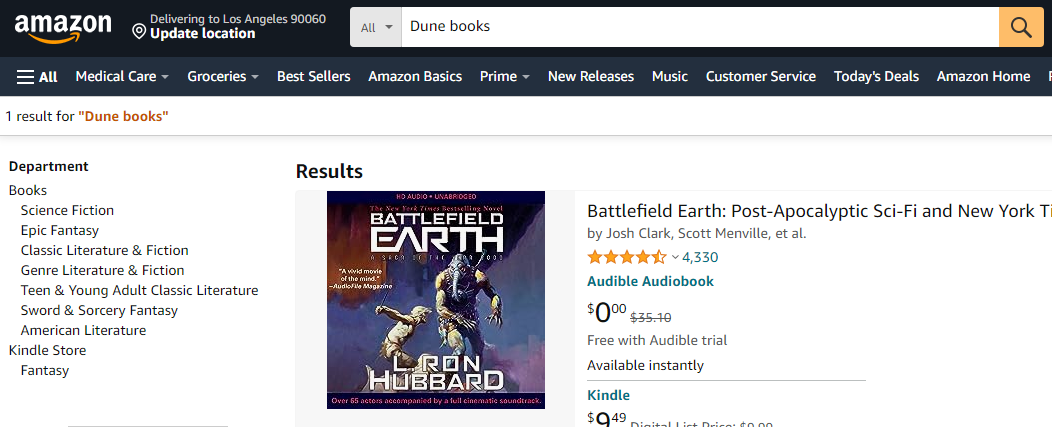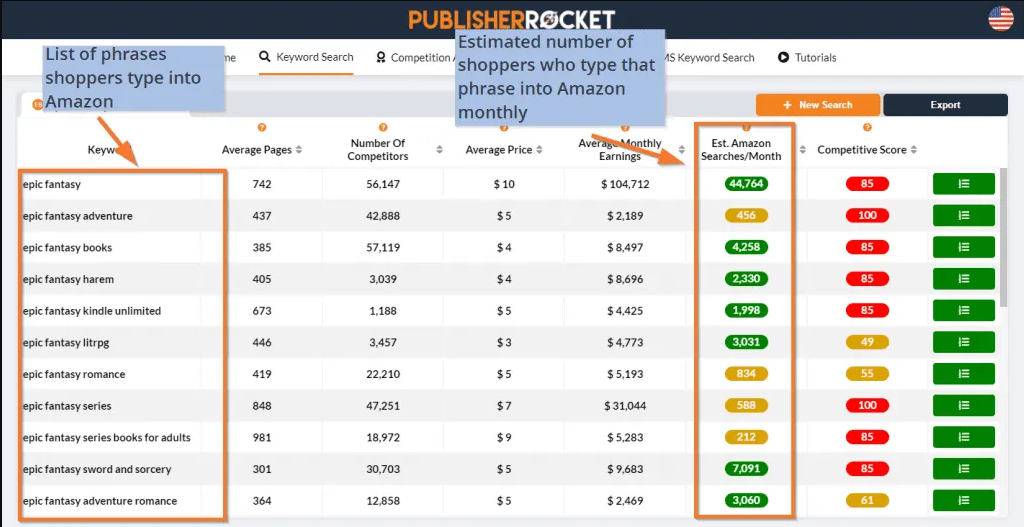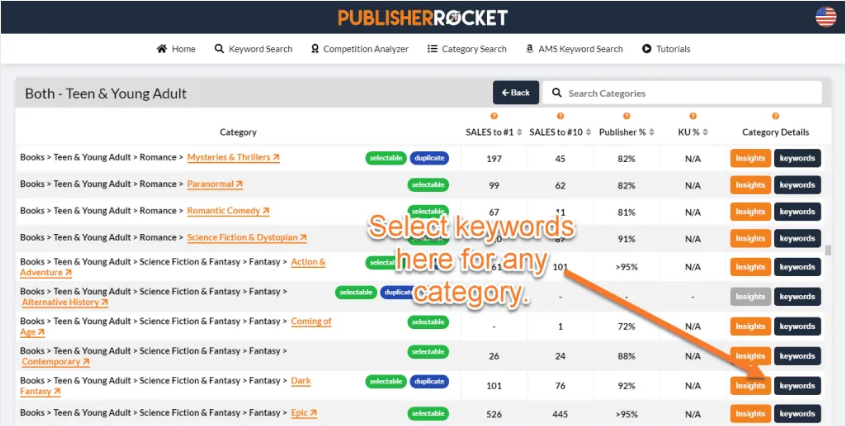In a digital age where the internet reigns supreme, the success of your book largely depends on its visibility online. Keyword research is one of the most powerful tools for boosting visibility and sales.
For independent publishers, this is extremely important. With the vast number of new books being published each year, finding the right keywords can mean the difference between reaching your reader or promoting into the abyss. UNESCO estimates that 2.2 million books are published every year. (UNESCO is the United Nations Educational, Scientific and Cultural Organization and the leading source for information regarding publishing statistics.)
Understanding how to research for and use keywords effectively can significantly increase your book sales. It is not just about finding popular keywords; it’s about understanding your target audience and what they are searching for.
Understanding Keyword Research
Keywords are the words and phrases people use in search engines to find their next book. The search engines are literal—whether Amazon’s search window, Google, or Bing, they are computers, and the exact words must be used. With artificial intelligence (AI) and other advances, the quality of search results improve. However, it is still essential to understand that keywords are the “words and phrases” your potential readers use to search for books. You have to think like a reader.
Effective keyword research to find these exact words and phrases used by your target readers can help you reach them, increase visibility, and drive book sales.
You want to use keywords that will cause your book to appear in the search result when someone types it in. Readers search for what they want to buy, and the top results make the most sales. If your book shows up when a reader searches for a book or topic, there’s a good chance they will buy it.
Steps to Conduct Keyword Research
1. Identify your niche: Define your book’s genre and target audience.
To get started, consider what one of your readers would likely type into Amazon or Google if they were looking for a book like yours.
For example, one of our most popular titles is Battlefield Earth, a science fiction classic by L. Ron Hubbard.
Readers for this book are likely to be searching for books using words like: “classic science fiction,” “books like Dune,” “alien invasion,” “epic space opera,” and other genre words. You want your book to come up at the top of the search, like this example of Battlefield Earth showing in the search results for “Dune Books”:

This is the first step. Once you have a few ideas, you will check for their usefulness and discover more words using online tools.
2. Find a keyword research tool: You need an effective tool to help you analyze these words and find more.
Below are several sites with keyword tools you can check out for yourself.
3. Understand the types of keywords
You will need different sets of targeted words based on your potential use of the words. As the subject of keywords and keyword research is vast, we will take up Amazon keywords for your book for this article. Amazon recommends five types of keyword research:
From Amazon: “There are five keyword types to consider, which range from broad to specific. It’s important to initially select words from all types and then optimize according to performance. Here we’ve used Emily Brontë’s classic, Wuthering Heights, as an example to show the types of keywords you’ll need for your books”:

Source: advertising.amazon.com/library/guides/keyword-strategy-guide-book-sales
4. Research and analyze keywords.
For starters, you need to know how to analyze the keyword tool results:
Search Volume: How many people search for a particular keyword each month.
Competition: How difficult will it be for your book to compete for this word(s) because other books are already “winning” in the search results?
Relevance: Is the keyword relevant to your book and target audience? If someone looking for alien adventure sees your book on dog training, they are not likely to buy it. Or worse, if they are searching for alien adventure and think your book is about this and buy it, they will be upset if it is not, in fact, about alien adventure. You want to create a positive experience with the reader. They will buy more if they love your book (this is what they are looking for).
To access the Publisher Rocket App (the tool I’m using for this example), you’ll need to download it at publisherrocket.com/download.
The first keywords you need are for your book on Amazon. KDP (Kindle Direct Publishing) allows seven keywords (up to 50 characters in each keyword box; you will want to use all 50 characters, which may give you 30 words or more).
Select the keyword option tab at the top of the screen and type in the first word you want to check (those your target audience will likely be looking for, as in #1 above). Publisher Rocket will pull up results for this word and others that may be similar and worth considering.

You want to select keywords with high monthly searches but low competition scores that are still relative to your book.
If you need more words, use the category tab. Search for the categories that fit your title, and, as you can only select three, select relevant ones that have low competition (use the second column that shows how many sales in the category are needed to reach the #10 spot—the lower this number, the more likely your book will do well in this category):

Click on the option to view keywords on the far right of the category. These keywords will help Amazon associate your book with that category.
If you still need more keywords, here are some prompts to try (use your answers in the tool to determine the best ones to use):
Fiction Keyword Prompts
- Your character or their role
- The setting and time of the story
- The catalyst that drives your story
- Your genre or type of story (e.g., classic space opera, inspirational story of overcoming the impossible, triumph against bullies)
- Synonyms of the above
Nonfiction Keyword Prompts
- Pain points of your target reader
- The success your reader hopes to gain from your book
- The type of reader or demographic
- Descriptive words about the benefits of reading your book
- Synonyms of the above
Examples of Useful Keyword Types
- Setting: Colonial America, Futuristic Earth, Mars
- Character types: single dad, veteran, unlikely hero
- Character roles: strong female lead, honorable military soldier
- Plot themes: coming of age, forgiveness, redemption
- Story tone: dystopian, feel-good, post-apocalyptic survival
Once you selected the best keywords, combine them in the most logical order and put them in the seven keyword box in KDP. For example, customers search for “military science fiction” but probably not for “fiction science military.”
5. Use these keywords.
Use your keywords everywhere you can.
Having the target keywords in your book title and description helps Amazon index your book for those phrases and gives the customer confidence your book fits those search results.
Best practices include:
- Use keywords in your metadata fields.
- Use keywords in your book title and subtitle.
- Ensure your book description uses keywords and phrases.
- Note: Do not “stuff” in the key words, which means repeating words or phrases. (Amazon can penalize you for this.)
- Use keywords on your author sites: professional website, blog page, Goodreads page, Amazon’s author page, and social media pages.
Including keywords is really the art of using the customer’s own words.
The best use of your keywords is when you strategically and artfully add them to your description to entice the reader to buy your book. This isn’t just about rankings, but about knowing your target shopper and meeting their needs, addressing their concerns, and ultimately helping them realize your book is the best book for their needs.
Mastering keyword research is essential for the success of your book business. Follow the steps outlined in this guide to effectively use keywords to reach a wider audience, boost visibility, and increase sales.
Kimberly A. Catalano is the senior vice president of global sales and rights at Galaxy Press.